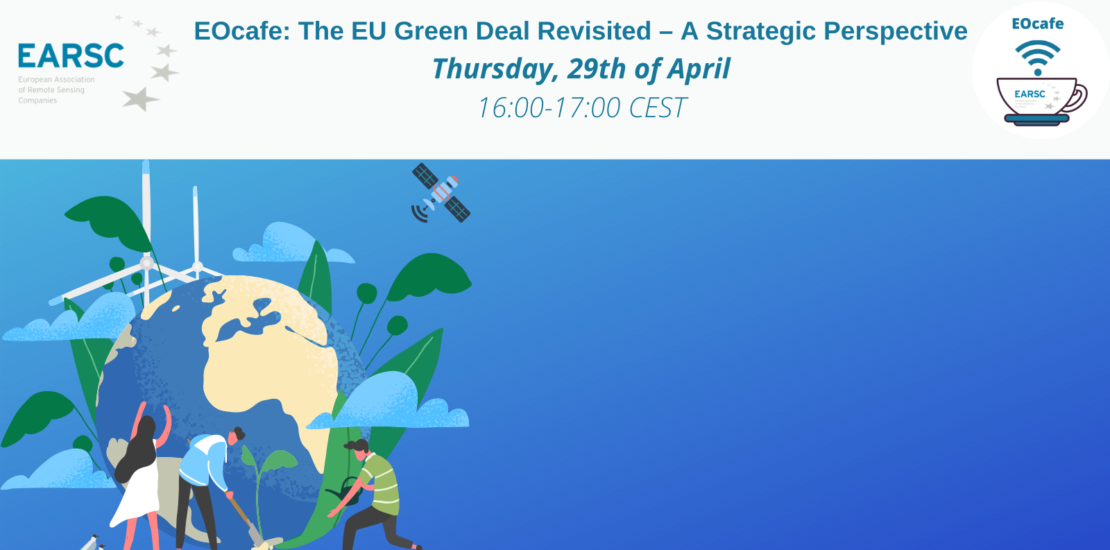- April 22, 2021
- Posted by: EARSC
- Categories: EOcafe, European EO Industry

The EU Green Deal Revisited – A Strategic Perspective
Thursday 29th of April 2021, 16:00-17:00 CEST
The European Green Deal is an ambitious plan to decarbonise the EU economy by 2050, revolutionise the EU’s energy system, profoundly transform the economy and inspire efforts to combat climate change. Amongst its many facets, it has a strong dimension for sustainable agriculture (food security) called “farm to fork” as well as a strong focus on urbanisation. The Green Deal has strong geopolitical implications in many policy areas including working with others to achieve global goals.
With the Green Deal, the European Commission has set a very ambitious goal to preserve our planet and promote the old continent as the key leader in the environmental arena. The EU budget along with the Recovery Plan will provide the finance to support these goals. The Green Deal will be a key policy driver executed under the various EC programmes. The Research budget – Horizon Europe – will be a core part of the activity which will also be aligned with the 5 Missions defined by the Research Commissioner and especially that for climate adaptation. Earth Observation has a key enabling role to play within this policy framework.
In this perspective, the tools provided by Earth Observation are many and essential. With horizontal medium and long-term objectives, the European Green Deal has to rely on cross-sector approaches entrusting different EO instruments, in apparently, unrelated domains. These domains cover the macro areas of agriculture, forest management, biodiversity, fisheries, water management and smart mobilities. As aforementioned, by monitoring, analyzing, predicting and mitigating human activity on natural resources, Earth Observation represents one of the most important tools for reaching a low carbon economy. Having reached this political commitment, the further step for the Union will be to turn it into a legal obligation amongst the Member States[1].
The private sector has a major role to play as is recognised in the need for an industrial policy. Companies can provide services supporting European objectives and space and earth Observation have strong potential to drive renewed economic growth. Digital tools such as artificial intelligence can help the industry provide new, global services. The programme Destination Earth launched by DG Connect and the JRC (Joint Research Centre) can bring together researchers and businesses to develop new tools to understand, monitor and manage global development.
In the EOcafe, we shall return to the subject of the Green Deal and how it will impact EU policies over the next 30 years and, in the shorter term, how it will shape the various programmes planned under the next Financial Perspective. These will include the space programme, the digital strategy as well as environmental policy, transport policy, energy policy. Indeed, just about every area of the EU activities will be affected. Our host, Geoff SAWYER (EARSC’s Strategic Advisor and former Secretary General) together with our guest, Anastasios KENTARCHOS (Deputy Head of the Ecological and Social Transitions Unit, DG RTD shall take a high-level perspective of the Green Deal to try to shed some light on the broad reach it will have but also to drill down into the question of research and how the resources of Horizon Europe will be deployed in its support.
More specific, in this EOcafe we will discuss the following:
- What will be the specific high-level goals of the Green Deal?
- How will these goals be reflected in the EU policies and reflected in EC priorities?
- How will these be translated into operational instruments and whose authority?
- In what way will the Horizon Europe programme be organised to support the Green Deal ambitions?
- How will Horizon Europe be reflected in the 5 Societal Mission Areas and how will these be linked?
- What are the key elements which the private sector supplying EO services can bring to support the EU priorities?
Registration: This webinar is open to ALL but priority will be given to EARSC members. Registration is free but compulsory. Please click on the following link to register.
Please note this is a virtual event!
EOcafe is part of a series of EARSC meetings that offer timely, relevant, and practical information on a broad variety of topics related to the EO sector. Join us every two weeks to discuss and network while enjoying a cup of coffee with friends.
IMPORTANT NOTES!!!
- The use of a video camera is not mandatory but encouraged to facilitate better interaction among the attendees and the guest speaker(s).
- The EOcafe will stay open after 17:00 in case our guests want to continue the discussion.
- By registering for this event, you accept the terms and conditions (https://earsc.org/wp-content/uploads/2021/03/EARSC_Events_GDPR.pdf).
If you have any questions, and/or you want to know more about the EOcafe, and/or you want to share an idea about a future EOcafe, please contact Natassa (Natassa.antoniou@earsc.org).
[1] The European Climate Law proposal was submitted to the European Parliament, the Council, the Economic and Social Committee and the Committee of the Regions for further consideration under the ordinary legislative procedure.
